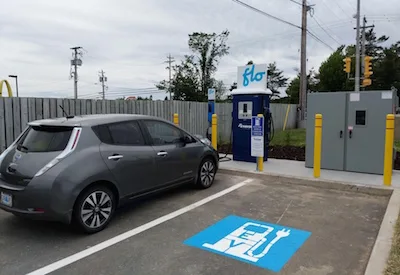Wolfville – Making the switch to an electric vehicle (EV) is a win-win for families looking to save money while reducing pollution. Due to cheaper refuelling and lower maintenance costs, most EVs cost less than their gas-powered counterparts over their lifetime.
Canadians are also benefiting from federal investments across the EV supply chain, which are positioning Canada as a leader in the growing global EV market and creating good manufacturing jobs across the country.
Member of Parliament, Kody Blois, on behalf of Jonathan Wilkinson, Canada’s Minister of Energy and Natural Resources, announced federal investments in two organizations to install 660 Level 2 EV chargers across Nova Scotia:
- $3,054,725 million to Polycorp Group of Companies to install 634 Level 2 chargers at nine multi-unit residential buildings across the province; and,
- $95,596 to 292 Main Street Developments Limitedto install 26 Level 2 chargers across the province.
All the chargers are expected to be installed by December 2024 and will help EV drivers get to where they need to go with confidence and ease. Before hitting the roads, Canadians can easily map out their route by consulting Natural Resources Canada’s (NRCan) Electric Charging and Alternative Fuelling Stations Locator.
To help drivers make the switch to EVs, the Government of Canada is supporting the deployment of a coast-to-coast-to-coast network of charging stations along highways and in communities’ public places, on-street, in multi-unit residential buildings, at workplaces and for vehicle fleets. To date, NRCan investments are helping to deploy over 41,000 EV chargers across the country where they are most needed. This month, the federal government launched a new request for proposals (RFP) under the Zero Emission Vehicle Infrastructure Program. This new round of projects will support the deployment of EV chargers, including fast chargers, in public places across Canada such as highways and public lots. The RFP will also support the deployment of chargers at private locations, including multi-unit residential buildings, workplaces and buildings where on-road vehicle fleets are serviced.
Since 2020, automotive and battery manufacturers have announced investments in Canada of more than $34 billion to transition to electric vehicle production and to establish a battery supply chain. The government has also worked to secure critical battery manufacturing investments through special contribution agreements and the Clean Technology Manufacturing Investment Tax Credit. Additional investments made toward the development of a Battery Innovation Roadmap will help Canada lay out its capacity to develop, commercialize and scale up a sustainable domestic battery innovation ecosystem. Together, these investments are creating thousands of sustainable jobs across the EV value chain.
The investments announced today support commitments included in the recent Electric Vehicle Availability Standard, which aims to further accelerate the Canadian adoption of zero-emission vehicles (ZEVs), ultimately contributing to the national targets of all vehicles sales being ZEV by 2035.
“We’re making electric vehicles more affordable and charging more available where Canadians live, work, travel and play. Investing in more EV chargers, like the ones announced today in Nova Scotia, will put more Canadians in the driver’s seat on the road to a strong, healthy net-zero future.” – Jonathan Wilkinson, Canada’s Minister of Energy and Natural Resources








